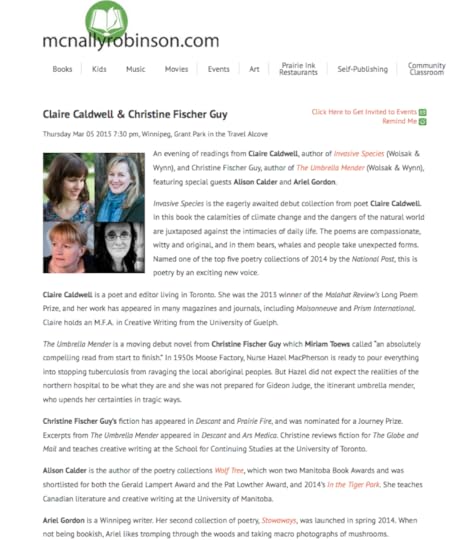Ariel Gordon's Blog, page 22
March 14, 2015
Out-of-Town-Authors: Claire Caldwell
Winnipeg Free Press—PRINT EDITION
By Ariel Gordon
Claire Caldwell is a Toronto writer. She writes poems, teaches poetry workshops for kids and edits Harlequin romances. She's currently touring Invasive Species, her first book. She recently took the time to talk to Ariel Gordon.
 Q: What do you want people to know about Invasive Species?
Q: What do you want people to know about Invasive Species?
A: Well, as the cover and title suggest, the book is populated by both animals and people, including urban cougars, a dead whale, multiple bears, brothers, New Mexican moths, medical students and a psychic. There are some vegetables and minerals, too.
Q: Tell me about that strange object/phenomena called 'the first book.'
 A. People keep asking me how long it took me to write the book, and my best answer is, "my whole life." Obviously, none of the poems I wrote in Grade 7 made it into the collection (RIP "Song of the Licorice Tree"), but it does feel like all of my writing efforts from childhood until now led to or culminated in this final product. Which makes writing a second one daunting!
A. People keep asking me how long it took me to write the book, and my best answer is, "my whole life." Obviously, none of the poems I wrote in Grade 7 made it into the collection (RIP "Song of the Licorice Tree"), but it does feel like all of my writing efforts from childhood until now led to or culminated in this final product. Which makes writing a second one daunting!
Another thing I've found interesting—though it might not be a first-book phenomenon, exclusively— is that I don't feel done with a lot of the themes I tackled in Invasive Species. I felt like I only truly understood what the book was about in the final phase of writing. I still feel motivated and invigorated by the question of our place in the natural world and what it means to conceive of the "natural" world as separate from humanity/society. I'm still writing poems about the relationships we have with animals and the spectre of climate change.
Q: How do you approach writing poems about animals? Do you start with field guides? With first-hand observations? Do you have an ethics of writing about animals?
A: I tend to start with anecdotes I hear or read about animals and humans coming into contact in bizarre or unusual ways, or sometimes I'll come across snippets of biological/zoological research that will be the jumping-off point for a poem. I'm not sure I have an ethics of writing about animals, but that's really interesting to think about: How do you ethically represent subjects that have no way to access or conceptualize those representations (as far as we know)? I guess my general goal is to interrogate the lines we draw between ourselves and animals, to explore both our fundamental differences and where those lines begin to blur.
Q: Also, can you write about nature these days without talking about climate change?
A: I don't think so. Even if you don't address climate change explicitly, I think any nature writing today is going to have a shadow hanging over it—a sense of loss/dread/urgency that's informed by what's happening all around us.
FP: According to your bio, you edit "wholesome romances and action-adventure novels" at Harlequin. Tell me about the constraints of romances versus poetry. Tell me about moving between commercial and so-not-commercial genres.
A: My approaches to editing and writing are very different to begin with, so it's hard to say how much of the distinction comes from the genre versus the work itself. I'm often asked about the Harlequin "formula," but I swear there is no such thing! There is definitely form and structure, though, and I find it very rewarding to walk that fine line between fulfilling certain promises to readers (the heat level for example, or the happy ending) and developing compelling, motivated characters and fresh plots. I love rolling up my sleeves to help authors shape their stories, and I enjoy how collaborative that process is.
Writing poems is quite solitary, by comparison, and it still feels a bit alchemical to me—so many conditions have to almost magically fall into place for me to feel like I'm really in the writing zone, whereas I can sit down and start editing without a second thought.
FP: To people on the Prairies, who rarely spend more than 30 or 40 minutes in transit, Toronto's hour or more commutes seem like mythical spaces. (People in Toronto talk about their commutes, whereas people in Winnipeg talk about the weather... ). Do you bus-write?
A: My commute is a bit too hectic to write—getting a seat can be dicey, and I have to transfer subway lines/buses. Sometimes I will jot down an idea or image in my phone, though. Commuting is actually my prime reading time. Though we all complain about public transit, I'm grateful that there's a mostly reliable mode of transportation that allows me to get lost in a book every day. Of course, there are moments when the intimacy of reading can be a bit awkward in such a public space—you wonder if people are judging your book choice, or you start crying or laughing at a particular passage.
Ariel Gordon is a Winnipeg writer.
By Ariel Gordon
Claire Caldwell is a Toronto writer. She writes poems, teaches poetry workshops for kids and edits Harlequin romances. She's currently touring Invasive Species, her first book. She recently took the time to talk to Ariel Gordon.
 Q: What do you want people to know about Invasive Species?
Q: What do you want people to know about Invasive Species?A: Well, as the cover and title suggest, the book is populated by both animals and people, including urban cougars, a dead whale, multiple bears, brothers, New Mexican moths, medical students and a psychic. There are some vegetables and minerals, too.
Q: Tell me about that strange object/phenomena called 'the first book.'
 A. People keep asking me how long it took me to write the book, and my best answer is, "my whole life." Obviously, none of the poems I wrote in Grade 7 made it into the collection (RIP "Song of the Licorice Tree"), but it does feel like all of my writing efforts from childhood until now led to or culminated in this final product. Which makes writing a second one daunting!
A. People keep asking me how long it took me to write the book, and my best answer is, "my whole life." Obviously, none of the poems I wrote in Grade 7 made it into the collection (RIP "Song of the Licorice Tree"), but it does feel like all of my writing efforts from childhood until now led to or culminated in this final product. Which makes writing a second one daunting!Another thing I've found interesting—though it might not be a first-book phenomenon, exclusively— is that I don't feel done with a lot of the themes I tackled in Invasive Species. I felt like I only truly understood what the book was about in the final phase of writing. I still feel motivated and invigorated by the question of our place in the natural world and what it means to conceive of the "natural" world as separate from humanity/society. I'm still writing poems about the relationships we have with animals and the spectre of climate change.
Q: How do you approach writing poems about animals? Do you start with field guides? With first-hand observations? Do you have an ethics of writing about animals?
A: I tend to start with anecdotes I hear or read about animals and humans coming into contact in bizarre or unusual ways, or sometimes I'll come across snippets of biological/zoological research that will be the jumping-off point for a poem. I'm not sure I have an ethics of writing about animals, but that's really interesting to think about: How do you ethically represent subjects that have no way to access or conceptualize those representations (as far as we know)? I guess my general goal is to interrogate the lines we draw between ourselves and animals, to explore both our fundamental differences and where those lines begin to blur.
Q: Also, can you write about nature these days without talking about climate change?
A: I don't think so. Even if you don't address climate change explicitly, I think any nature writing today is going to have a shadow hanging over it—a sense of loss/dread/urgency that's informed by what's happening all around us.
FP: According to your bio, you edit "wholesome romances and action-adventure novels" at Harlequin. Tell me about the constraints of romances versus poetry. Tell me about moving between commercial and so-not-commercial genres.
A: My approaches to editing and writing are very different to begin with, so it's hard to say how much of the distinction comes from the genre versus the work itself. I'm often asked about the Harlequin "formula," but I swear there is no such thing! There is definitely form and structure, though, and I find it very rewarding to walk that fine line between fulfilling certain promises to readers (the heat level for example, or the happy ending) and developing compelling, motivated characters and fresh plots. I love rolling up my sleeves to help authors shape their stories, and I enjoy how collaborative that process is.
Writing poems is quite solitary, by comparison, and it still feels a bit alchemical to me—so many conditions have to almost magically fall into place for me to feel like I'm really in the writing zone, whereas I can sit down and start editing without a second thought.
FP: To people on the Prairies, who rarely spend more than 30 or 40 minutes in transit, Toronto's hour or more commutes seem like mythical spaces. (People in Toronto talk about their commutes, whereas people in Winnipeg talk about the weather... ). Do you bus-write?
A: My commute is a bit too hectic to write—getting a seat can be dicey, and I have to transfer subway lines/buses. Sometimes I will jot down an idea or image in my phone, though. Commuting is actually my prime reading time. Though we all complain about public transit, I'm grateful that there's a mostly reliable mode of transportation that allows me to get lost in a book every day. Of course, there are moments when the intimacy of reading can be a bit awkward in such a public space—you wonder if people are judging your book choice, or you start crying or laughing at a particular passage.
Ariel Gordon is a Winnipeg writer.
Published on March 14, 2015 11:53
March 13, 2015
Poetry in Voice 2015

* * *
So I'm one of the online semifinal judges for Poetry in Voice again this year.
Which is great in and of itself: high school students reciting poetry that they've memorized. High school students reading and listening to poems...
I'm happier still that of the ten judges, four of ten are once and future Manitobans.
(We've taken over! Finally!)
Published on March 13, 2015 20:32
March 7, 2015
Half-full reading
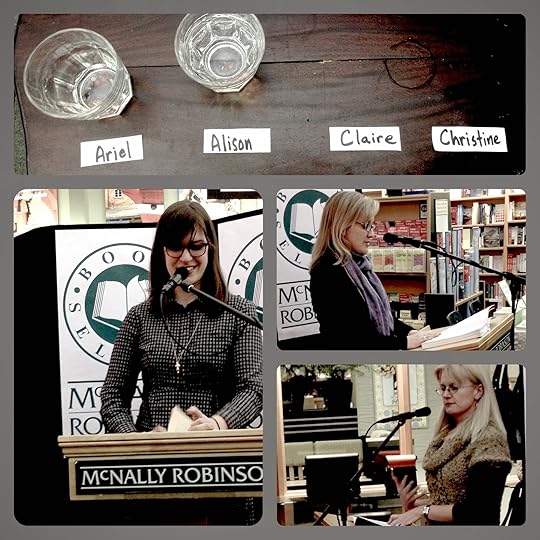
(clockwise, from top left): Christine Fischer Guy, Alison Calder, Claire Caldwell read at McNally Robinson on March 5.
* * *
My favourite part of this evening, besides the readings, besides the chance to chat with such smart women, was the fact that McNally Robinson event coordinator John Toews not only set out water for us but labelled the water, so that we wouldn't get confused.
My favourite moment of the evening came when Claire Caldwell read a poem with both moons and elephants in it and Alison Calder leaned back in her chair and flashed me a startled-yet-pleased look, given her tendency towards same.
Thanks to Wolsak & Wynn for setting the thing up, to McNally's for hosting, and to Alison, who read even though she'd never been properly asked. (I maintain that the great majority of poets would be abjectly grateful if they were just scheduled for readings without the bother of being asked beforehand...)
Published on March 07, 2015 11:46
March 4, 2015
February-ing

* * *
So, February was full of dust and pestilence. We were all sick and the sickness went on and on...
But Feb was also full of walking, specifically walking amidst the slabs of white marble in the Southwood Lands, and immersing myself in my great-grandfather's 1913-1914 Antarctic journal.
I tried to commit to more walking, in all weather. I silvered my eyelashes more than a few times. And when I wasn't doing that, I was stealing an hour here, ninety minutes there, to read and transcribe, to read and think, on the contents of my g-grandfather's journal.
My grandfather was 42 when he died in 1914 on South Georgia. I'm almost 42 now, a hundred years later, reading his impressions on the landscape, on the weather, on the Frigate Birds and the King Penguins and the Leopard Seals. I kind of like that synergy, even while I try to talk back to it, to counter his adventure with my domesticity.
Published on March 04, 2015 21:17
February 26, 2015
All that winter sun
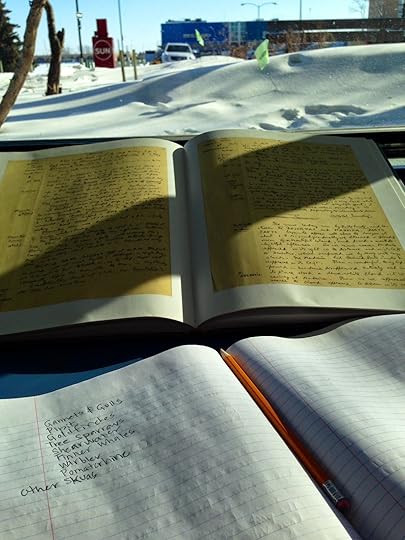
* * *
When it's a Sunday afternoon in February and the track at Pan Am Pool is closed and the girl is doing karate down the hall, I find a window in all that winter sun and start making a list of birds in my great-grandfather's Antarctic journal...
Published on February 26, 2015 09:48
February 21, 2015
Out-of-Town-Authors: Christine Fischer Guy
Winnipeg Free Press—PRINT EDITION
By Ariel Gordon
Christine Fischer Guy is a Toronto-based writer and journalist.
Her first novel, The Umbrella Mender, is the story of a TB nurse in northern Ontario in the 1950s, when the Canadian Public Health Association estimates more than a third of Inuit were infected with tuberculosis.
 (TB remains a problem in the north—some northern Manitoba First Nations have recorded some of the highest TB rates in the world.)
(TB remains a problem in the north—some northern Manitoba First Nations have recorded some of the highest TB rates in the world.)
The umbrella mender of the title is Gideon Judge, an American drifter searching for the Northwest Passage.
Fischer Guy will be in Winnipeg with fellow Wolsak & Wynn author Claire Caldwell on March 5. She recently spoke with Winnipeg writer Ariel Gordon.
 Q. What do you want people to know about The Umbrella Mender?
Q. What do you want people to know about The Umbrella Mender?
A. Hazel MacPherson was an idealistic young nurse who went to the North at an exciting time in the history of medicine—there was finally a cure for tuberculosis, and they would use it to help the disease-ravaged northern communities—hoping to find what she was looking for. She got her wish, but not in the way she expected, and kept secrets about her year there for 60 years. The Umbrella Mender is her reckoning with those secrets.
Q. Tell me about that strange object/phenomena called 'the first book.'
A. It certainly is an out-of-body experience for a lifelong bookworm. I was one of those kids for whom the perfect Saturday was a trip to the library and the rest of the day flopped on my bed reading what I'd brought home. I spent close to ten years writing this book, so of course I was thrilled when Wolsak & Wynn wanted to publish it, but I had a keen awareness as I worked on the edits of those who went before me. It was both humbling and comforting to be connected to them in the struggle to say what I meant to say with this book. My editor, Paul Vermeersch, was my favourite kind of editor (I've been a journalist for decades, so I know what I like.) He'd point something out that wasn't working and trust me to fix it, and he was always available as a sounding board. W&W made a beautiful object for me and it's a thrill to see it on bookstore shelves.
Q. How did you find yourself in northern Ontario in the 1950s? Was the TB epidemic among the Indigenous peoples of that region where you started or where you wound up?
A. This novel was inspired by a memoir written by my great-uncle through marriage, who was a TB doctor in the North at the time of my novel, 1951. After we'd met for the first time and he became aware that I was the family writer, he gave me his memoirs. It was the most exciting medicine he'd practiced in his career and he wanted to share it. I know he was very happy that I became fascinated with that time and place because he was enthusiastic in response to my requests for more information, and I interviewed him several times before he died in 2006. Besides being a consummate healer he was a wonderful storyteller and loved to talk about the time he spent in the North.
Having said that, this novel is an act of imagination, not a fictionalization of his story. It's about the campaign on TB in the same way as Atonement is about the Second World War: it's a historical scaffolding for some questions I have about the nature of love. It was very important to me that my novel and his memoir be separate entities, and I spent the first three years after reading the memoir wandering into a frustrating series of blind corners and alleys that were largely due to cleaving too closely to his story. Once Hazel and then Gideon came along, my own story took root and I could begin to move.
Q. What were the challenges of writing about the setting of Moose Factory? Had you spent much time there? Or is it a completely imagined place and time?
A. Thanks to an Ontario Arts Council grant, I was able to spend a week up there in 2008, researching and learning the place with my feet. I interviewed many who had worked in the hospital at the time my novel is set (some are in the elder lodge now) or who were patients there. So I did know it by experience, but I will always be grateful to Google Earth for its views of Moose Factory. They helped me root myself there and so it was often open on my desktop as I wrote.
Q. What are you reading right now? What are you writing right now?
A. I usually have a few things on the go at any given time. I just finished Martha Baillie's new novel The Search for Heinrich Schlgel, which was as wonderful as I expected it to be. Her metafictive approach is more elegant than any other I've read. Ayelet Tsabari's short story collection The Best Place on Earth is also in my reading pile: She has a voice I know I can trust to help me better understand Israel and Palestine. Poetry fills the language well for me and right now I'm reading Paul Vermeersch's Don't Let it End Like This Tell Them I Said Something, Kayla Czaga's arresting For Your Safety Please Hold On, and Catherine Graham's beautiful Her Red Hair Rises with the Wings of Insects. I'm also reading, belatedly, Adrienne Rich's incredible On Lies, Secrets, and Silence.
I've been working on a new novel for about a year now, and am also finishing up a short story that may or may not be connected to it. Both are set in New York, a complete change of pace in time and setting.
Ariel Gordon is a Winnipeg writer.
By Ariel Gordon
Christine Fischer Guy is a Toronto-based writer and journalist.
Her first novel, The Umbrella Mender, is the story of a TB nurse in northern Ontario in the 1950s, when the Canadian Public Health Association estimates more than a third of Inuit were infected with tuberculosis.
 (TB remains a problem in the north—some northern Manitoba First Nations have recorded some of the highest TB rates in the world.)
(TB remains a problem in the north—some northern Manitoba First Nations have recorded some of the highest TB rates in the world.)The umbrella mender of the title is Gideon Judge, an American drifter searching for the Northwest Passage.
Fischer Guy will be in Winnipeg with fellow Wolsak & Wynn author Claire Caldwell on March 5. She recently spoke with Winnipeg writer Ariel Gordon.
 Q. What do you want people to know about The Umbrella Mender?
Q. What do you want people to know about The Umbrella Mender?A. Hazel MacPherson was an idealistic young nurse who went to the North at an exciting time in the history of medicine—there was finally a cure for tuberculosis, and they would use it to help the disease-ravaged northern communities—hoping to find what she was looking for. She got her wish, but not in the way she expected, and kept secrets about her year there for 60 years. The Umbrella Mender is her reckoning with those secrets.
Q. Tell me about that strange object/phenomena called 'the first book.'
A. It certainly is an out-of-body experience for a lifelong bookworm. I was one of those kids for whom the perfect Saturday was a trip to the library and the rest of the day flopped on my bed reading what I'd brought home. I spent close to ten years writing this book, so of course I was thrilled when Wolsak & Wynn wanted to publish it, but I had a keen awareness as I worked on the edits of those who went before me. It was both humbling and comforting to be connected to them in the struggle to say what I meant to say with this book. My editor, Paul Vermeersch, was my favourite kind of editor (I've been a journalist for decades, so I know what I like.) He'd point something out that wasn't working and trust me to fix it, and he was always available as a sounding board. W&W made a beautiful object for me and it's a thrill to see it on bookstore shelves.
Q. How did you find yourself in northern Ontario in the 1950s? Was the TB epidemic among the Indigenous peoples of that region where you started or where you wound up?
A. This novel was inspired by a memoir written by my great-uncle through marriage, who was a TB doctor in the North at the time of my novel, 1951. After we'd met for the first time and he became aware that I was the family writer, he gave me his memoirs. It was the most exciting medicine he'd practiced in his career and he wanted to share it. I know he was very happy that I became fascinated with that time and place because he was enthusiastic in response to my requests for more information, and I interviewed him several times before he died in 2006. Besides being a consummate healer he was a wonderful storyteller and loved to talk about the time he spent in the North.
Having said that, this novel is an act of imagination, not a fictionalization of his story. It's about the campaign on TB in the same way as Atonement is about the Second World War: it's a historical scaffolding for some questions I have about the nature of love. It was very important to me that my novel and his memoir be separate entities, and I spent the first three years after reading the memoir wandering into a frustrating series of blind corners and alleys that were largely due to cleaving too closely to his story. Once Hazel and then Gideon came along, my own story took root and I could begin to move.
Q. What were the challenges of writing about the setting of Moose Factory? Had you spent much time there? Or is it a completely imagined place and time?
A. Thanks to an Ontario Arts Council grant, I was able to spend a week up there in 2008, researching and learning the place with my feet. I interviewed many who had worked in the hospital at the time my novel is set (some are in the elder lodge now) or who were patients there. So I did know it by experience, but I will always be grateful to Google Earth for its views of Moose Factory. They helped me root myself there and so it was often open on my desktop as I wrote.
Q. What are you reading right now? What are you writing right now?
A. I usually have a few things on the go at any given time. I just finished Martha Baillie's new novel The Search for Heinrich Schlgel, which was as wonderful as I expected it to be. Her metafictive approach is more elegant than any other I've read. Ayelet Tsabari's short story collection The Best Place on Earth is also in my reading pile: She has a voice I know I can trust to help me better understand Israel and Palestine. Poetry fills the language well for me and right now I'm reading Paul Vermeersch's Don't Let it End Like This Tell Them I Said Something, Kayla Czaga's arresting For Your Safety Please Hold On, and Catherine Graham's beautiful Her Red Hair Rises with the Wings of Insects. I'm also reading, belatedly, Adrienne Rich's incredible On Lies, Secrets, and Silence.
I've been working on a new novel for about a year now, and am also finishing up a short story that may or may not be connected to it. Both are set in New York, a complete change of pace in time and setting.
Ariel Gordon is a Winnipeg writer.
Published on February 21, 2015 10:42
February 20, 2015
Starry-eyed
It's February. And this is my state-of-the-nation.
I got these starry lashes in a geared-up Wolseley/Wellington loop walk with a friend.
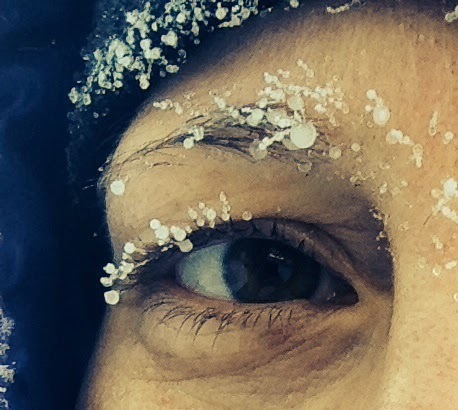 I was wearing my BIG MEC jacket, the one that is equivalent to wearing my bed out in the world.
I was wearing my BIG MEC jacket, the one that is equivalent to wearing my bed out in the world.
It has an enormous, down-filled hood, and I'd cinched it tight for this walk, mostly because Environment Canada had issued an extreme weather warning.
And the only part of me that was cold was my legs, even though I was snowpants. And that was a manageable cold.
When we were nearly finished—by which I mean that we were at his street and my pockets were full of frozen lumps that had once been tissues—my friend said, "You've got extraordinary eyelashes right now."
So I dug my phone out and selfied my eye. MY EYE.
(And then I went home and wrote two poems. Which is an even better outcome.)
I got these starry lashes in a geared-up Wolseley/Wellington loop walk with a friend.
 I was wearing my BIG MEC jacket, the one that is equivalent to wearing my bed out in the world.
I was wearing my BIG MEC jacket, the one that is equivalent to wearing my bed out in the world.It has an enormous, down-filled hood, and I'd cinched it tight for this walk, mostly because Environment Canada had issued an extreme weather warning.
And the only part of me that was cold was my legs, even though I was snowpants. And that was a manageable cold.
When we were nearly finished—by which I mean that we were at his street and my pockets were full of frozen lumps that had once been tissues—my friend said, "You've got extraordinary eyelashes right now."
So I dug my phone out and selfied my eye. MY EYE.
(And then I went home and wrote two poems. Which is an even better outcome.)
Published on February 20, 2015 09:08
February 18, 2015
Reading: Claire Caldwell & Christine Fischer Guy
Published on February 18, 2015 09:11
February 13, 2015
Reprint: M-K 2015 Artist and Storytelling Retreats
Announcing the Muskwa-Kechika 2015 Artist and Storytelling Retreats
Imagine sitting around a fire deep in the wilds and experiencing the spine-tingling stories of Ivan Coyote and Art Napoleon amidst moose and caribou while listening to the calls of loons or splashes of otters.
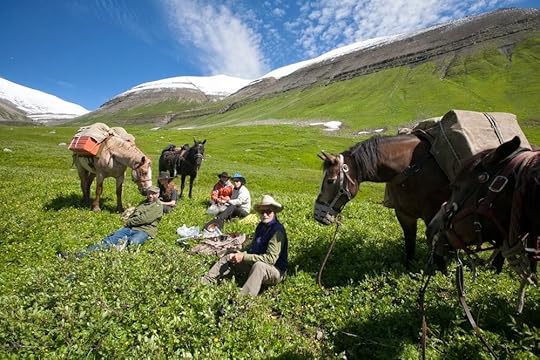 Copyright go2mc.caOr how about feeling your creative juices flow after spirited talks with award winning poets Ariel Gordon and Melanie Siebert on the shoulder of a mountain where few humans have walked?
Copyright go2mc.caOr how about feeling your creative juices flow after spirited talks with award winning poets Ariel Gordon and Melanie Siebert on the shoulder of a mountain where few humans have walked?
Wayne Sawchuk of Muskwa-Kechika Adventures and Donna Kane of Writing on the Ridge are working to make this happen.
In the summer of 2015, artists will have a once-in-a-lifetime opportunity to experience the greatest wilderness in the Rocky Mountains while honing their craft in the company of exceptional mentors.
From August 9-16, artists working in a wide variety of disciplines (e.g. visual art, writing, photography, video, music) will fly from Muncho Lake to Mayfield Lake, deep in the heart of the Muskwa-Kechika, to explore their craft against the backdrop of nature and wilderness.
Under the mentorship of acclaimed Winnipeg writer, Ariel Gordon, author of two books of nature poetry and winner of the John Lent Poetry-Prose Award, and poet and backcountry guide Melanie Siebert, whose first book of poetry, Deepwater Vee, was shortlisted for the Governor General’s Award, artists will broaden their perceptions of nature and wilderness.
 “The artist retreats that ran from 2006-2009 produced a wonderful variety of work that has been shown in galleries and published in books and journals across the country,” says Donna Kane, director of Writing on the Ridge. “We are delighted to be able to provide another opportunity in 2015.”
“The artist retreats that ran from 2006-2009 produced a wonderful variety of work that has been shown in galleries and published in books and journals across the country,” says Donna Kane, director of Writing on the Ridge. “We are delighted to be able to provide another opportunity in 2015.”
In all, over 50 artists have taken part in past retreats, including internationally renowned artist Brian Jungen and poets Don McKay, Elizabeth Bachinsky, and Sue Sinclair.
From August 16-23, storytellers will gather at Mayfield Lake under the inspired mentorship of storytellers Ivan Coyote and Art Napoleon.
“Getting the chance to hear stories from Art and Ivan around a campfire will be a highlight for me—it’s going to be an incredible experience!” says Wayne Sawchuk.
Art Napoleon is an award-winning songwriter, storyteller and humorist with a mystic's heart. Former Chief of the Saulteau First Nations, Art also stars in the television show, Moosemeat and Marmalade, which premiered in January of 2015. This revolutionary new cooking show contrasts traditional First Nations’ and World Cuisine cooking styles.
 Copyright go2mc.caIvan Coyote was born and raised in Whitehorse, Yukon Territory. An award-winning author and a renowned performer, Ivan’s first love is live storytelling and over the last nineteen years has become an audience favourite at sold out shows from Anchorage to Amsterdam. Ivan Coyote’s newest book “Gender Failure,” co- authored with Rae Spoon, is a poignant collection of autobiographical essays, lyrics, and images that reveal that gender comes in more than two sizes.
Copyright go2mc.caIvan Coyote was born and raised in Whitehorse, Yukon Territory. An award-winning author and a renowned performer, Ivan’s first love is live storytelling and over the last nineteen years has become an audience favourite at sold out shows from Anchorage to Amsterdam. Ivan Coyote’s newest book “Gender Failure,” co- authored with Rae Spoon, is a poignant collection of autobiographical essays, lyrics, and images that reveal that gender comes in more than two sizes.
All in all, it’s an impressive line-up. Add the setting of pristine wilderness, friendly horses, and like-minded campmates, and the 2015 retreats promise an unforgettable experience.
The goal of the retreats, besides sheer enjoyment and honing one’s skills as an artist, is to raise awareness of the Muskwa-Kechika. The greatest wilderness in the Rockies, it boasts more species of large mammals, in greater abundance, than anywhere else in North America. Participants will be asked to contribute a story or written piece that features the MK to a web-based site, as a means of bringing this globally important area to a wider audience.
For more information on the retreats visit www.go2mk.ca or contact Wayne Sawchuk at (250) 759-4993 or wsawchuk@pris.ca .
Imagine sitting around a fire deep in the wilds and experiencing the spine-tingling stories of Ivan Coyote and Art Napoleon amidst moose and caribou while listening to the calls of loons or splashes of otters.
 Copyright go2mc.caOr how about feeling your creative juices flow after spirited talks with award winning poets Ariel Gordon and Melanie Siebert on the shoulder of a mountain where few humans have walked?
Copyright go2mc.caOr how about feeling your creative juices flow after spirited talks with award winning poets Ariel Gordon and Melanie Siebert on the shoulder of a mountain where few humans have walked?Wayne Sawchuk of Muskwa-Kechika Adventures and Donna Kane of Writing on the Ridge are working to make this happen.
In the summer of 2015, artists will have a once-in-a-lifetime opportunity to experience the greatest wilderness in the Rocky Mountains while honing their craft in the company of exceptional mentors.
From August 9-16, artists working in a wide variety of disciplines (e.g. visual art, writing, photography, video, music) will fly from Muncho Lake to Mayfield Lake, deep in the heart of the Muskwa-Kechika, to explore their craft against the backdrop of nature and wilderness.
Under the mentorship of acclaimed Winnipeg writer, Ariel Gordon, author of two books of nature poetry and winner of the John Lent Poetry-Prose Award, and poet and backcountry guide Melanie Siebert, whose first book of poetry, Deepwater Vee, was shortlisted for the Governor General’s Award, artists will broaden their perceptions of nature and wilderness.
 “The artist retreats that ran from 2006-2009 produced a wonderful variety of work that has been shown in galleries and published in books and journals across the country,” says Donna Kane, director of Writing on the Ridge. “We are delighted to be able to provide another opportunity in 2015.”
“The artist retreats that ran from 2006-2009 produced a wonderful variety of work that has been shown in galleries and published in books and journals across the country,” says Donna Kane, director of Writing on the Ridge. “We are delighted to be able to provide another opportunity in 2015.”In all, over 50 artists have taken part in past retreats, including internationally renowned artist Brian Jungen and poets Don McKay, Elizabeth Bachinsky, and Sue Sinclair.
From August 16-23, storytellers will gather at Mayfield Lake under the inspired mentorship of storytellers Ivan Coyote and Art Napoleon.
“Getting the chance to hear stories from Art and Ivan around a campfire will be a highlight for me—it’s going to be an incredible experience!” says Wayne Sawchuk.
Art Napoleon is an award-winning songwriter, storyteller and humorist with a mystic's heart. Former Chief of the Saulteau First Nations, Art also stars in the television show, Moosemeat and Marmalade, which premiered in January of 2015. This revolutionary new cooking show contrasts traditional First Nations’ and World Cuisine cooking styles.
 Copyright go2mc.caIvan Coyote was born and raised in Whitehorse, Yukon Territory. An award-winning author and a renowned performer, Ivan’s first love is live storytelling and over the last nineteen years has become an audience favourite at sold out shows from Anchorage to Amsterdam. Ivan Coyote’s newest book “Gender Failure,” co- authored with Rae Spoon, is a poignant collection of autobiographical essays, lyrics, and images that reveal that gender comes in more than two sizes.
Copyright go2mc.caIvan Coyote was born and raised in Whitehorse, Yukon Territory. An award-winning author and a renowned performer, Ivan’s first love is live storytelling and over the last nineteen years has become an audience favourite at sold out shows from Anchorage to Amsterdam. Ivan Coyote’s newest book “Gender Failure,” co- authored with Rae Spoon, is a poignant collection of autobiographical essays, lyrics, and images that reveal that gender comes in more than two sizes. All in all, it’s an impressive line-up. Add the setting of pristine wilderness, friendly horses, and like-minded campmates, and the 2015 retreats promise an unforgettable experience.
The goal of the retreats, besides sheer enjoyment and honing one’s skills as an artist, is to raise awareness of the Muskwa-Kechika. The greatest wilderness in the Rockies, it boasts more species of large mammals, in greater abundance, than anywhere else in North America. Participants will be asked to contribute a story or written piece that features the MK to a web-based site, as a means of bringing this globally important area to a wider audience.
For more information on the retreats visit www.go2mk.ca or contact Wayne Sawchuk at (250) 759-4993 or wsawchuk@pris.ca .
Published on February 13, 2015 13:00
February 5, 2015
Reprint: Humpday

* * *
McNally Robinson Booksellers in Winnipeg posted this yesterday, which for the record was a Wednesday.
And it was just what I needed to get over that PARTICULAR hump.
Published on February 05, 2015 08:42

